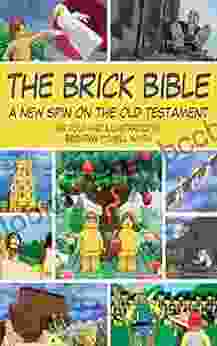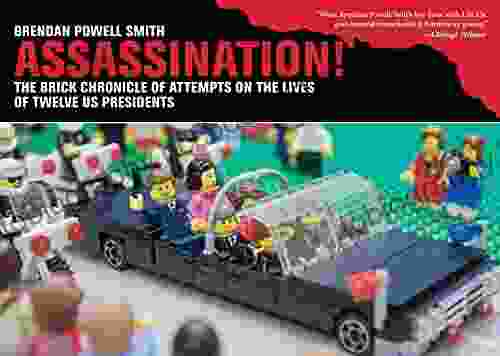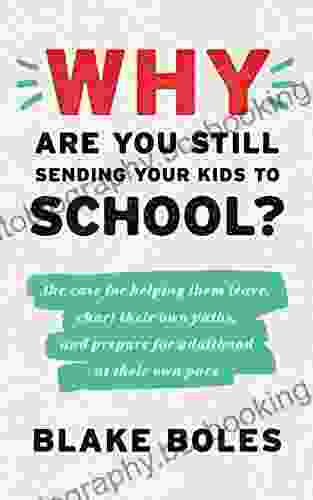Why Are You Still Sending Your Kids To School?

The Ultimate Guide to Unschooling
In today's rapidly changing world, the traditional education system is increasingly falling short of preparing our children for the challenges and opportunities of the 21st century.
4.5 out of 5
| Language | : | English |
| File size | : | 1877 KB |
| Text-to-Speech | : | Enabled |
| Screen Reader | : | Supported |
| Enhanced typesetting | : | Enabled |
| X-Ray | : | Enabled |
| Word Wise | : | Enabled |
| Print length | : | 266 pages |
| Lending | : | Enabled |
More and more parents are questioning the value of sending their kids to school and are instead opting for unschooling, an alternative approach to education that allows children to learn at their own pace and in a way that is tailored to their individual needs and interests.
If you're considering unschooling your child, this guide will provide you with everything you need to know to get started, including:
- The benefits of unschooling
- The challenges of unschooling
- The practical steps involved in unschooling
- Resources for unschooling parents
The Benefits of Unschooling
There are many benefits to unschooling, including:
- Children learn at their own pace. In school, children are forced to learn at the same pace as their classmates, regardless of their individual needs. This can be frustrating for children who are ahead or behind their peers. Unschooling allows children to learn at their own pace, so they can spend more time on the subjects they're interested in and less time on the subjects they find difficult.
- Children learn in a way that is tailored to their individual needs and interests. In school, children are taught the same material in the same way, regardless of their individual learning styles or interests. This can be ineffective for children who learn best through hands-on activities or who are interested in topics that aren't covered in the school curriculum. Unschooling allows children to learn in a way that is tailored to their individual needs and interests, so they can develop their full potential.
- Children develop a love of learning. In school, children often learn out of fear of punishment or the desire for rewards. This can lead to a negative association with learning. Unschooling allows children to learn out of a natural curiosity and love of knowledge, which can lead to a lifelong passion for learning.
- Children become more independent and self-motivated. In school, children are constantly being told what to do and when to do it. This can lead to a lack of independence and self-motivation. Unschooling allows children to make their own choices about what they want to learn and how they want to learn it, which can help them develop a strong sense of independence and self-motivation.
- Children develop strong social skills. In school, children spend most of their time with children their own age. This can lead to a lack of exposure to different people and cultures. Unschooling allows children to interact with people of all ages and backgrounds, which can help them develop strong social skills.
The Challenges of Unschooling
There are also some challenges to unschooling, including:
- Parents need to be involved in their children's education. Unschooling is not a hands-off approach to education. Parents need to be actively involved in their children's learning, providing them with support and guidance. This can be a challenge for parents who are working or who have other commitments.
- Children may not be exposed to the same material as their peers. Unschooled children may not learn the same material as their peers in school. This can be a concern for parents who are worried about their children's future educational opportunities. However, there are many ways to ensure that unschooled children receive a well-rounded education, including through online courses, extracurricular activities, and field trips.
- Unschooling can be isolating. Unschooled children may not have the same opportunities to interact with other children their own age as they would in school. This can be a concern for parents who are worried about their children's social development. However, there are many ways to provide unschooled children with opportunities to socialize, including through homeschooling co-ops, extracurricular activities, and community events.
The Practical Steps Involved in Unschooling
If you're considering unschooling your child, there are a few practical steps you need to take:
- Research unschooling. Before you make a decision about unschooling, it's important to do your research. There are many books, websites, and blogs about unschooling. You can also talk to other parents who are unschooling their children.
- Create a learning environment. Once you've decided to unschool your child, you need to create a learning environment that is conducive to learning. This includes providing your child with access to books, materials, and experiences that will support their learning.
- Follow your child's interests. The best way to unschool your child is to follow their interests. This means providing them with opportunities to learn about the things that they're passionate about. You can do this through books, field trips, and hands-on activities.
- Be patient. Unschooling is a journey, and it takes time to find your rhythm. Don't get discouraged if you don't see results immediately. Just keep following your child's interests and providing them with support and guidance, and they will eventually learn and thrive.
Resources for Unschooling Parents
There are many resources available to help unschooling parents, including:
- The Unschooling Handbook by Mary Griffith
- Free Range Learning by Laura Grace Weldon
- The Homeschool Legal Defense Association
- The National Association for the Education of Young Children
Unschooling is a valid and effective alternative to traditional education. It allows children to learn at their own pace, in a way that is tailored to their individual needs and interests. Unschooling can help children develop a love of learning, become more independent and self-motivated, and develop strong social skills.
If you're considering unschooling your child, I encourage you to do your research and talk to other parents who are unschooling their children. Unschooling is not for everyone, but it can be a wonderful option for children who are not thriving in the traditional school system.
4.5 out of 5
| Language | : | English |
| File size | : | 1877 KB |
| Text-to-Speech | : | Enabled |
| Screen Reader | : | Supported |
| Enhanced typesetting | : | Enabled |
| X-Ray | : | Enabled |
| Word Wise | : | Enabled |
| Print length | : | 266 pages |
| Lending | : | Enabled |
Do you want to contribute by writing guest posts on this blog?
Please contact us and send us a resume of previous articles that you have written.
 Book
Book Novel
Novel Page
Page Chapter
Chapter Text
Text Story
Story Genre
Genre Reader
Reader Library
Library Paperback
Paperback E-book
E-book Magazine
Magazine Newspaper
Newspaper Paragraph
Paragraph Sentence
Sentence Bookmark
Bookmark Shelf
Shelf Glossary
Glossary Bibliography
Bibliography Foreword
Foreword Preface
Preface Synopsis
Synopsis Annotation
Annotation Footnote
Footnote Manuscript
Manuscript Scroll
Scroll Codex
Codex Tome
Tome Bestseller
Bestseller Classics
Classics Library card
Library card Narrative
Narrative Biography
Biography Autobiography
Autobiography Memoir
Memoir Reference
Reference Encyclopedia
Encyclopedia Boy Scouts Of America
Boy Scouts Of America Ben Hatke
Ben Hatke Bill Snow
Bill Snow Ben Malisow
Ben Malisow Beverly Conyers
Beverly Conyers Becky Goldsmith
Becky Goldsmith Bella Forrest
Bella Forrest Blake Neri
Blake Neri Brad Brewer
Brad Brewer Brad Stone
Brad Stone Bold Kids
Bold Kids Bonnie Bryant
Bonnie Bryant Berkeley Breathed
Berkeley Breathed Becky Munsterer Sabky
Becky Munsterer Sabky Beth Brykman
Beth Brykman Bishara Awad
Bishara Awad Bernard Craw
Bernard Craw Becci Murray
Becci Murray Betsy Prioleau
Betsy Prioleau Becky Stephen
Becky Stephen
Light bulbAdvertise smarter! Our strategic ad space ensures maximum exposure. Reserve your spot today!

 Giovanni MitchellUnlock the Secrets of Enchantment: A Journey Through The Pocket Guide To...
Giovanni MitchellUnlock the Secrets of Enchantment: A Journey Through The Pocket Guide To... José SaramagoFollow ·18.6k
José SaramagoFollow ·18.6k Abe MitchellFollow ·13.4k
Abe MitchellFollow ·13.4k Dennis HayesFollow ·7.1k
Dennis HayesFollow ·7.1k Rob FosterFollow ·4.5k
Rob FosterFollow ·4.5k Duane KellyFollow ·17.8k
Duane KellyFollow ·17.8k John UpdikeFollow ·2.4k
John UpdikeFollow ·2.4k Guillermo BlairFollow ·12.8k
Guillermo BlairFollow ·12.8k Ralph Waldo EmersonFollow ·18.8k
Ralph Waldo EmersonFollow ·18.8k

 Alex Foster
Alex FosterRediscover the Old Testament with a Captivating Graphic...
Prepare to embark on an extraordinary...

 Ross Nelson
Ross NelsonThe Christmas Story: The Brick Bible for Kids
LEGO® Bricks Meet the...

 Anton Chekhov
Anton ChekhovUnveiling the Hidden History: The Brick Chronicle of...
In the annals of American history, the...

 Blake Bell
Blake BellOptions Trading Crash Course: A Comprehensive Guide to...
In the fast-paced and...

 Percy Bysshe Shelley
Percy Bysshe ShelleyUnlock Your Artistic Potential with "The Practical...
The Indispensable Handbook for...
4.5 out of 5
| Language | : | English |
| File size | : | 1877 KB |
| Text-to-Speech | : | Enabled |
| Screen Reader | : | Supported |
| Enhanced typesetting | : | Enabled |
| X-Ray | : | Enabled |
| Word Wise | : | Enabled |
| Print length | : | 266 pages |
| Lending | : | Enabled |












